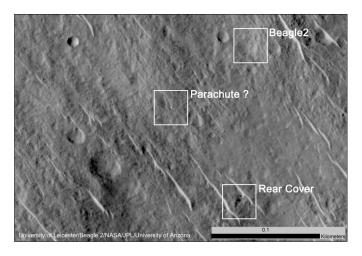
|
Components of Beagle 2 Flight System on Mars
- Click the image above for a larger view
- Full-Res JPEG (5844 x 4135) (2.1 MB)
- Full-Res TIFF (5844 x 4135) (24.2 MB)
Caption:
This annotated image shows where features seen in a 2014 observation by NASA's Mars Reconnaissance Orbiter have been interpreted as hardware from the Dec. 25, 2003, arrival at Mars of the United Kingdom's Beagle 2 Lander.
Beagle 2 was released by the European Space Agency's Mars Express orbiter but never heard from after its expected landing. Images from the High Resolution Imaging Science Experiment (HiRISE) camera on Mars Reconnaissance Orbiter have been interpreted as showing the Beagle 2 did make a soft landing and at least partially deployed its solar panels.
The 0.1-kilometer scale bar indicates a dimension of 328 feet. The location is approximately 11.5 degrees north latitude, 90.4 degrees east latitude.
The image is an excerpt from HiRISE observation ESP_037145_1915, taken June 29, 2014. Other image products from this observation are available at ESP_037145_1915 .
Background Info:
The University of Arizona, Tucson, operates HiRISE, which was built by Ball Aerospace & Technologies Corp., Boulder, Colo. NASA's Jet Propulsion Laboratory, a division of the California Institute of Technology in Pasadena, manages the Mars Reconnaissance Orbiter Project for NASA's Science Mission Directorate, Washington.
Cataloging Keywords:
| Name | Value | Additional Values |
|---|---|---|
| Target | Mars | |
| System | ||
| Target Type | Planet | |
| Mission | Mars Reconnaissance Orbiter (MRO) | Mars Express, Mars Express (MEX) |
| Instrument Host | Mars Reconnaissance Orbiter | Mars Express Lander, Mars Express Orbiter |
| Host Type | Orbiter | Lander |
| Instrument | High Resolution Imaging Science Experiment (HiRISE) | |
| Detector | ||
| Extra Keywords | Grayscale | |
| Acquisition Date | ||
| Release Date | 2015-01-16 | |
| Date in Caption | 2003-12-25 | 2014-06-29 |
| Image Credit | NASA/JPL-Caltech/Univ. of Arizona/University of Leicester | |
| Source | photojournal.jpl.nasa.gov/catalog/PIA19106 | |
| Identifier | PIA19106 | |
